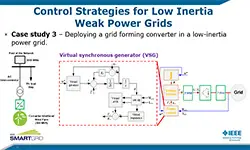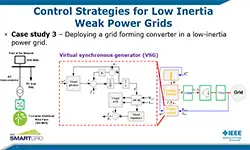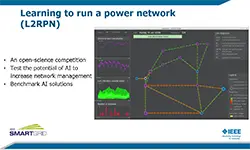-
Members: FreePES
IEEE Members: $45.00
Non-members: $70.00Pages/Slides: 68
Miroslav Begovic, President, IEEE Power & Energy Society building blocks, indeed March, 2014 To: Recipients of the 2014 IEEE PES Smart Grid Reprint Journal: "SMART GRID" is an idea and an outcome rather than a prescribed set of technologies. The ideas, the technologies and the approaches that fall under the smart grid rubric must be tailored to a diversity of circumstances and needs. No wonder "smart grid" must be a flexible, adaptable term, despite the concern that its meaning is too diffuse. For the concept to be suitably flexible, its meaning must be malleable. The same goes for the "tool kit," a phrase that underscores the diversity of approaches and solutions needed to meet the diversity of utility circumstances and needs around the world as the grid in its many forms is modernized. Let's add another critical piece: curriculum development for students and advanced training for working professionals. Multi-disciplinary studies and skills have become de rigueur for good reason: smart grid solutions often must combine technologies and approaches from different specialized fields. In fact, this is true not only in power, but in nearly every endeavor that applies technology to solve complex challenges. Thus it's fitting that the year-end compendium you hold in your hands is subtitled, "Building Blocks for Grid Modernization." "Building blocks" can be ideas, technologies, systems, standards, curriculum and more, all of which add flexibility and breadth to our tool kit. Our colleagues presented much new thinking to our challenges this year in the pages of Power & Energy Magazine and we're proud to present seven of them in this special issue. Buckle up, we'll be traveling from Kansas to China, France, Germany and the 19th century and the year 2032. In "Five Heads Are Better Than One", five authors devised a multidisciplinary curriculum for graduate students at Wichita State University in Kansas. The authors write, for instance, about "blended learning" as a tool for interdisciplinary education in energy systems. Students from varying disciplines received a customized set of online learning modules to address background deficiencies while classroom learning focused on a common theme. The value here lies in not just what to learn, but how to learn it! "Time in the Sun: The Challenge of High PV Penetration in the German Electric Grid" reveals challenges and solutions in a country where more than a million solar photovoltaic (PV) arrays interconnect with the grid. It's a glimpse at the future, for many countries are just beginning to see PV penetration at this level, with the accompanying technical challenges. The 19th century's "war of currents" pitted ac power against dc power, Tesla vs. Edison. Despite the outcome in favor ac, dc continues to present an attractive option for many applications, from efficient longdistance, high-voltage lines to renewable power for dc loads in homes and businesses. In "Harmonizing AC and DC" the authors discuss a hybrid AC / DC grid for the future, driven by the increasingly attractive gains in efficiency it offers. "Ecocity Up On a Hill" looks to the European experience with microgrids, a diverse animal with one name but many different configurations. The authors take us on a tour of three very different microgrids in France: one operates as an aggregator and virtual power plant, another as a municipal microgrid relying on cloud services and yet a third as a collection of medium- and low-voltage distribution microgrids with high concentrations of PV and "smart houses." China recognizes the value of efficiencies, particularly as they relate to its targets for energy conservation and emission reductions. In "Balance of Power," our colleagues report on efforts to integrate combined heat and power plants, expanded transmission lines and renewable power, elements that are not always compatible. Thus integration requires considerable attention and China is bringing policy, practices and technology to bear on its quest.


